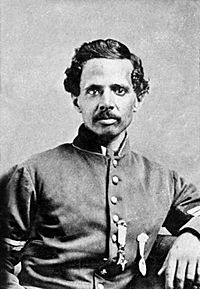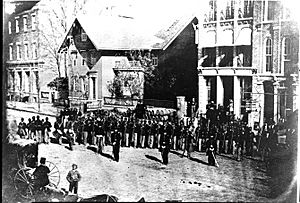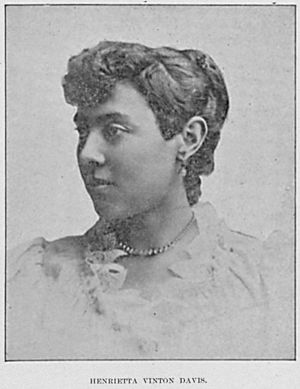Powhatan Beaty facts for kids
Quick facts for kids
Powhatan Beaty
|
|
|---|---|

First Sergeant Powhatan Beaty, of the 5th United States Colored Infantry Regiment, who was awarded the Medal of Honor, for taking command of his company at the Battle of Chaffin's Farm, after all officers had been killed and/or wounded.
|
|
| Born | October 8, 1837 Richmond, Virginia |
| Died | December 6, 1916 (aged 79) Cincinnati, Ohio |
| Place of burial |
Union Baptist Cemetery, Cincinnati, Ohio
|
| Allegiance | |
| Service/ |
|
| Years of service | 1863–1865 |
| Rank | |
| Unit | 5th Regiment United States Colored Troops |
| Battles/wars | |
| Awards | |
| Other work | Actor |
Powhatan Beaty (born October 8, 1837 – died December 6, 1916) was an African American soldier and actor. During the American Civil War, he served in the Union Army with the 5th United States Colored Infantry Regiment. He fought in the Richmond–Petersburg Campaign.
Beaty received the Medal of Honor, America's highest military award. He earned it for his bravery at the Battle of Chaffin's Farm. He took command of his company after all the officers were killed or hurt. After the war, he became a public speaker and actor. He performed in plays in his hometown of Cincinnati, Ohio. His most famous acting role was in 1884 in Washington, D.C., alongside Henrietta Vinton Davis.
Contents
Growing Up: Powhatan Beaty's Early Life
Powhatan Beaty was born enslaved on October 8, 1837, in Richmond, Virginia. In 1849, he moved to Cincinnati, Ohio, where he got an education. He became a free man sometime before April 19, 1861. The exact date he gained his freedom is not known.
While in school, Beaty became very interested in acting. He performed publicly for the first time at a school concert. After school, he trained to be a cabinet maker. He later worked as a turner, shaping wood. He kept studying acting privately. He even got lessons from James E. Murdock, a famous actor from Philadelphia.
Cincinnati's Black Brigade
A year after the Civil War started, there were fears of a Confederate attack on Cincinnati. This was after a Confederate victory in Kentucky in August 1862. On September 2, men in Cincinnati were asked to build defenses around the city.
At first, African Americans in Cincinnati were forced to join this effort. But things got better when William Dickson became their commander. He promised they would be treated fairly. They would also stay together as a special group called the Black Brigade.
Beaty joined Company Number 1 of the Brigade's 3rd Regiment. For 15 days, they worked hard. They cleared forests, built forts, and dug trenches. The Brigade was dismissed on September 20, when the danger passed.
Joining the United States Colored Troops

By June 1863, Ohio did not yet have its own African American fighting units. But black men from Ohio could join regiments in other states. Beaty enlisted in the Union Army from Cincinnati on June 7, 1863. He signed up for three years. He was part of a group joining a Massachusetts regiment.
He started as a private but was promoted to sergeant just two days later. He was put in charge of 47 other new soldiers. They were sent to Columbus, Ohio, then planned to go to Boston. But when they got to Columbus, they learned the Massachusetts regiments were full.
Ohio's Governor, David Tod, quickly asked to form an Ohio regiment for African Americans. Permission was given. On June 17, Beaty and his group became the first members of the 127th Ohio Volunteer Infantry. This unit was later renamed the 5th United States Colored Troops (USCT). After three months of training, they headed to Virginia.
Heroism at Chaffin's Farm
By September 29, 1864, Beaty was a first sergeant in Company G. This was during the Battle of Chaffin's Farm. His regiment, made of black troops, was ordered to attack Confederate defenses. These defenses were strong, with obstacles and armed soldiers.
The attack faced heavy enemy fire and was pushed back. During the retreat, Company G's flag bearer was killed. Beaty bravely went back through enemy fire to get the flag. He brought it safely back to his company.
His regiment had many casualties. Out of 8 officers and 83 enlisted men in Company G, only 16 men, including Beaty, were not hurt. With no officers left, Beaty took charge of the company. He led them in a second charge against the Confederates. This second attack succeeded, driving the Confederates away. For his brave actions, General Benjamin Butler praised Beaty on the battlefield. Seven months later, on April 6, 1865, Beaty received the Medal of Honor.
Continued Service and Recognition
Beaty kept showing great courage in other battles with the 5th Regiment. His actions in the Battle of Fair Oaks & Darbytown Road in October 1864 were even mentioned in official army orders. His commander, Colonel Giles Shurtleff, twice suggested he be promoted to officer. While this didn't happen, Beaty did receive a special "brevet" promotion to lieutenant. By the time he left the Army, he had fought in 13 battles and many smaller fights.
Life After the War
After the Civil War, Powhatan Beaty went back to Cincinnati. He started a family there. His son, A. Lee Beaty, later became an Ohio state lawmaker. He also worked as an assistant U.S. District Attorney.
Powhatan Beaty went back to his job as a turner. He also continued his passion for acting and public speaking. He gave public readings for charity and became a well-known speaker in Cincinnati's African American community. In the 1870s, he acted in local theaters. He also directed music and drama shows in the city.
He wrote a play called Delmar, or Scenes in Southland. It was about a rich Southern plantation owner. The play was performed in January 1881, with Beaty in the main role. It showed the end of slavery and the journey to freedom for black people from 1860 to 1875. The play was well-liked, but Beaty did not promote it widely, so it never moved to bigger public theaters.
Acting with Henrietta Vinton Davis
In January 1884, Beaty was working at the Cincinnati water works. That's when Henrietta Vinton Davis, a famous African American actress, came to perform in the city. Beaty and Davis put on a big music and drama show together. It was very successful.
The show included plays like Ingomar, the Barbarian and The Gladiator. Beaty played the role of Spartacus in The Gladiator. The highlight of the festival was a performance of scenes from Macbeth. Beaty played Macbeth, and Davis played Lady Macbeth. Newspapers in Cincinnati praised their acting.
This successful show led to Beaty being invited to act in a Washington, D.C., Shakespeare play. This production was organized by Davis. On May 7, 1884, Beaty, Davis, and other actors performed Richard III and scenes from Macbeth and Ingomar. The show was at Ford's Opera House to a full audience of over 1,100 people. Frederick Douglass was among them.
Newspapers in Washington praised the main actors. African American newspapers were especially happy to see such a show in an important place like Ford's Theater. One newspaper wrote that black men and women were "encroach[ing] upon the ground so long held sacred by their white brother and sister."
Beaty continued to tour with Davis. He performed a show in Philadelphia before returning to Cincinnati. He helped start his city's Literary and Dramatic Club. In 1888, he became the club's drama director. He lived the rest of his life in Cincinnati. He passed away at age 79 on December 6, 1916. He was buried at Union Baptist Cemetery.
 | Kyle Baker |
 | Joseph Yoakum |
 | Laura Wheeler Waring |
 | Henry Ossawa Tanner |


